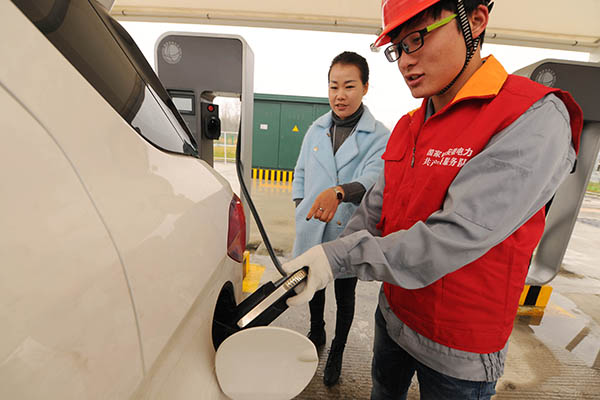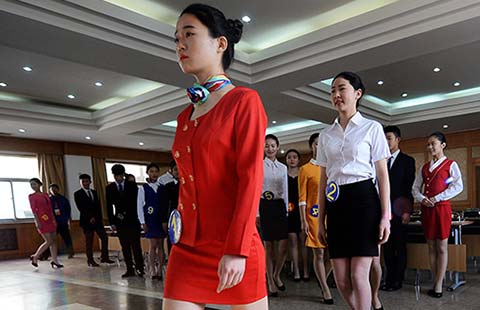State Grid plans to plug in 8 major expressways
By Lyu Chang (China Daily) Updated: 2016-02-20 09:34
 |
|
A worker helps a driver recharge her electric car at an expressway service station in Dingyuan, Anhui province. State Grid Corp plans to set up a nationwide charging network along all expressways and within cities. [Photo/China Daily] |
Main routes across country to be equipped with rapid charging stations for electric vehicles
State Grid Corp of China, the nation's biggest power transmission company, has installed electric-vehicle rapid charging stations in eight major expressways in the country.
The company said the expressways include the routes from Beijing to Shanghai, Shenyang to Haikou, Qingdao to Yinchuan and from Beijing to Macao via Hong Kong, with a charging station located every 50 kilometers.
Each station is equipped with four charging posts that can simultaneously provide power to four electric vehicles.
The State-owned company, headquartered in Beijing, plans to set up a nationwide charging network along all highways and within cities.
By 2020, it is aiming to build 10,000 rapid charging stations and 120,000 charging posts across 202 cities and 36,000 km of expressways.
It said in a statement on Friday it is inviting both public and private investors to help it reach its highly expensive goal.
The cost of a charging post with 10 chargers is approximately 5 million yuan ($767,000), not including land-use fees.
State Grid faces competition from China Tower Corp, a joint venture created to handle the network assets of the country's top three telecom carriers, which is also building a swathe of electric-car charging stations.
China, the world's largest energy consumer, aims to boost its electric-vehicle market to help reduce carbon dioxide emissions and air pollution, but the lack of charging facilities and power supply have hindered the government's development efforts.
Industry experts said while State Grid's plan to build more charging facilities will spur demand for new-energy vehicles, the company should learn from well-established markets such as Europe and the United States.
"The number of charging posts in China for electric-vehicle users is clearly not enough compared with the US," said Lu Jinyong, a professor at the University of International Business and Economics in Beijing, adding that in the US there are normally 10 charging posts in each station.
In Pasadena, California, every public parking lot has a free charging station where vehicles can plug in for 90 minutes. Chinese electric-vehicle drivers, on the other hand, have to pay fees for the use of electricity and service.
The number of new-energy vehicles to hit China's roads by 2020 will reach 300,000, according to a government estimate. Sales of new-energy vehicles in China rose by 144 percent year-on-year to 16,100 units in January.
- Wang Jianlin boosts Chinese management philosophy with English version of book
- Barcelona congress hotbed for Chinese technology startups
- Ground turns fertile for 'family' business to thrive
- Huawei unveils first convertible tablet
- Pregnant with new investments
- Tech giants reveal 5G innovations in Barcelona
- Comedy film company sees valuation soar
- China's LeTV sues Baidu for illicit competition
















